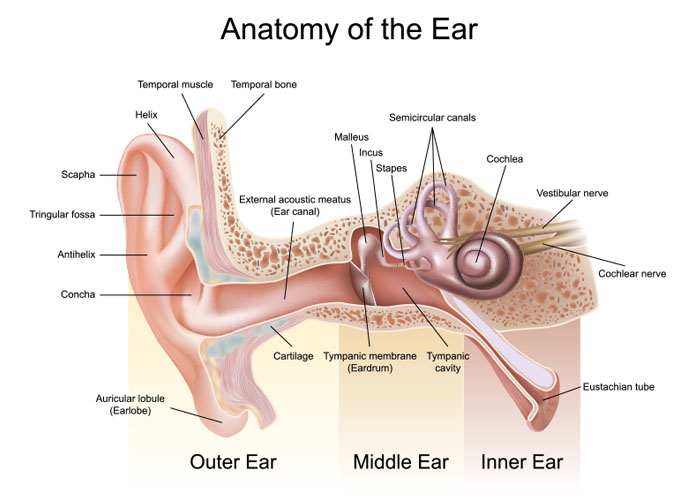- 6061 South Fort Apache Road
Suite 130, Las Vegas, NV 89148 - (702) 990-1568
- M-F 9:30am to 5:00pm

Understand Hearing Loss
Early stages of hearing loss can be hard to identify. Hearing loss is typically gradual in nature, and most people do not realize what sounds they are missing. “I often hear from my patients that they feel that people are mumbling or that voices don’t sound clear to them.” – Dr. Carrie Page-Unkel, M.S., CCC-A Clinical Audiologist at Southern Nevada Audiology.
The reason this is occurring is that there is damage in the inner ear and the sound signal is not being processed
correctly. Therefore, the brain is not receiving the correct information needed to process and understand speech.
Your ear consists of three major areas: outer ear, middle ear and inner ear. Sound waves pass through the outer ear and cause vibrations at the eardrum. The eardrum and three small bones of the middle ear amplify the vibrations as they travel to the inner ear. There, the vibrations pass through fluid in a snail-shaped structure in the inner ear (cochlea). Attached to nerve cells in the cochlea are thousands of tiny hairs that help translate sound vibrations into electrical signals that are transmitted to your brain. The vibrations of different sounds affect these tiny hairs in different ways, causing the nerve cells to send different signals to your brain. That's how you distinguish one sound from another.
Causes of Hearing Loss
There are various reasons for why hearing loss can occur:
Types of Hearing Loss
Conductive Hearing Loss
Conductive hearing loss is a decrease in sound due to problems located in either the middle ear or the outer ear. This type of hearing loss is often treatable with the right type of intervention such as medicine or surgery. A conductive hearing loss can have several causes. Among them are ear infections which tend to cause fluid in the middle ear, wax in the ear canal or a perforation of the eardrum.
Sensorineural Hearing Loss
Sensorineural hearing loss is a problem related to the inner ear and/or the nerve pathways between the inner ear and the brain. Along the most common causes of sensorineural hearing loss are:
1. Aging
2. Infection
3. Noise exposure, recreational, occupational, or military services
4. Meningitis
5. Certain genetic disorders
6. Meniere’s disease
7. Viruses
Sensorineural hearing loss cannot be cured medically, but hearing loss may be improved with the use of hearing aids.
Mixed Hearing Loss
Mixed hearing loss is the occurrence of both a conductive hearing loss and a sensorineural hearing loss at the same time. The inner ear and nerve paths are damaged and there is a blockage in either the middle ear or the outer ear. While the conductive hearing loss can usually be corrected, the sensorineural loss is permanent and hearing aids can often be used to improve it.




